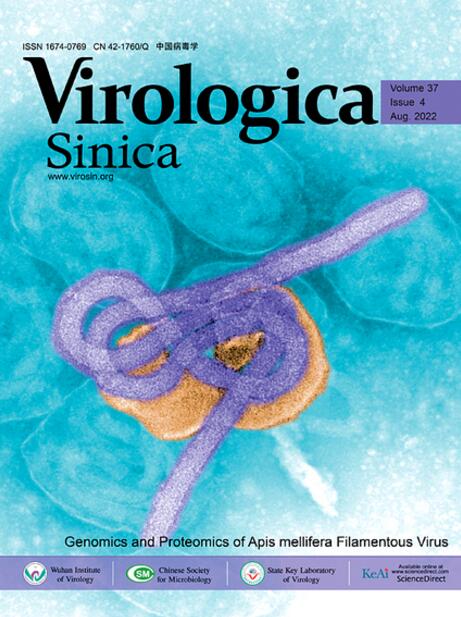重度肠病毒A71感染与T细胞免疫应答功能障碍相关,黄芪甲苷A可减轻其免疫功能障碍。
IF 4
3区 医学
Q1 Medicine
引用次数: 0
摘要
肠病毒A71 (EV-A71)是严重手足口病(HFMD)的主要致病病原体,手足口病是一种主要的儿童期相关传染病。儿童表现出严重的疾病进展,而成人通常表现出轻微或无症状感染的机制仍然不完全明确,这阻碍了针对这种疾病的有效治疗的发展。在此,我们利用EV-A71感染新生小鼠模型,发现T细胞发育不足与EV-A71感染的严重程度密切相关,并且EV-A71感染会显著损害T细胞的免疫应答。此外,T细胞免疫功能障碍有助于EV-A71感染的发病机制,因为T细胞的缺失使新生小鼠极易受到EV-A71感染。为了进一步评估t细胞免疫与手足口病之间的关系,我们招募了145名实验室确诊的EV-A71感染的儿科患者,发现t细胞免疫应答受损与这些儿童EV-A71引起的手足口病的严重程度有关。此外,我们发现用黄芪甲苷A(一种来自黄芪的皂苷)治疗新生小鼠,在体内以t细胞依赖的方式对EV-A71感染显示出强有力的治疗效果。总之,这些发现揭示了EV-A71感染与T细胞免疫之间的相互作用,为T细胞在EV-A71感染和手足口病发病机制中的生理影响提供了新的见解,并为治疗这种病毒性疾病找到了有希望的免疫治疗策略。本文章由计算机程序翻译,如有差异,请以英文原文为准。
Severe enterovirus A71 infection is associated with dysfunction of T cell immune response and alleviated by Astragaloside A
Enterovirus A71 (EV-A71) is the major causative pathogen for severe hand-foot-mouth disease (HFMD), a predominantly childhood-associated communicable disease. The mechanisms that children manifest severe disease progression while adults typically exhibit milder or asymptomatic infections remain incompletely characterized, which hinders the development of effective therapy against this disease. Herein, using the newborn mouse model of EV-A71 infection, we uncovered that the underdevelopment of T cells closely associated with the severity of EV-A71 infection, and EV-A71 infection dramatically impaired T-cell immune response. Moreover, the dysfunction of T-cell immunity contributes to the pathogenesis of EV-A71 infection, as the loss of T cells made neonatal mice highly vulnerable to EV-A71 infection. To further assess the relationship between T-cell immunity and HFMD, we enrolled a cohort of 145 pediatric patients with laboratory-confirmed EV-A71 infection and found that the compromised T-cell immune response is associated with the severity of EV-A71-caused HFMD in these children. Furthermore, we found that the treatment of newborn mice with Astragaloside A, a saponin from the medicinal herb Astragalus membranaceus, showed potent in vivo therapeutic efficacy against EV-A71 infection in a T-cell-dependent manner. In conclusion, these findings uncover the interaction between EV-A71 infection and T-cell immunity, provide novel insights onto the physiological impacts of T cells on the pathogenesis of EV-A71 infection and HFMD, and find a promising immunotherapeutic strategy to treat this viral disease.
求助全文
通过发布文献求助,成功后即可免费获取论文全文。
去求助
来源期刊

Virologica Sinica
Biochemistry, Genetics and Molecular Biology-Molecular Medicine
CiteScore
7.70
自引率
1.80%
发文量
3149
期刊介绍:
Virologica Sinica is an international journal which aims at presenting the cutting-edge research on viruses all over the world. The journal publishes peer-reviewed original research articles, reviews, and letters to the editor, to encompass the latest developments in all branches of virology, including research on animal, plant and microbe viruses. The journal welcomes articles on virus discovery and characterization, viral epidemiology, viral pathogenesis, virus-host interaction, vaccine development, antiviral agents and therapies, and virus related bio-techniques. Virologica Sinica, the official journal of Chinese Society for Microbiology, will serve as a platform for the communication and exchange of academic information and ideas in an international context.
Electronic ISSN: 1995-820X; Print ISSN: 1674-0769
 求助内容:
求助内容: 应助结果提醒方式:
应助结果提醒方式:


